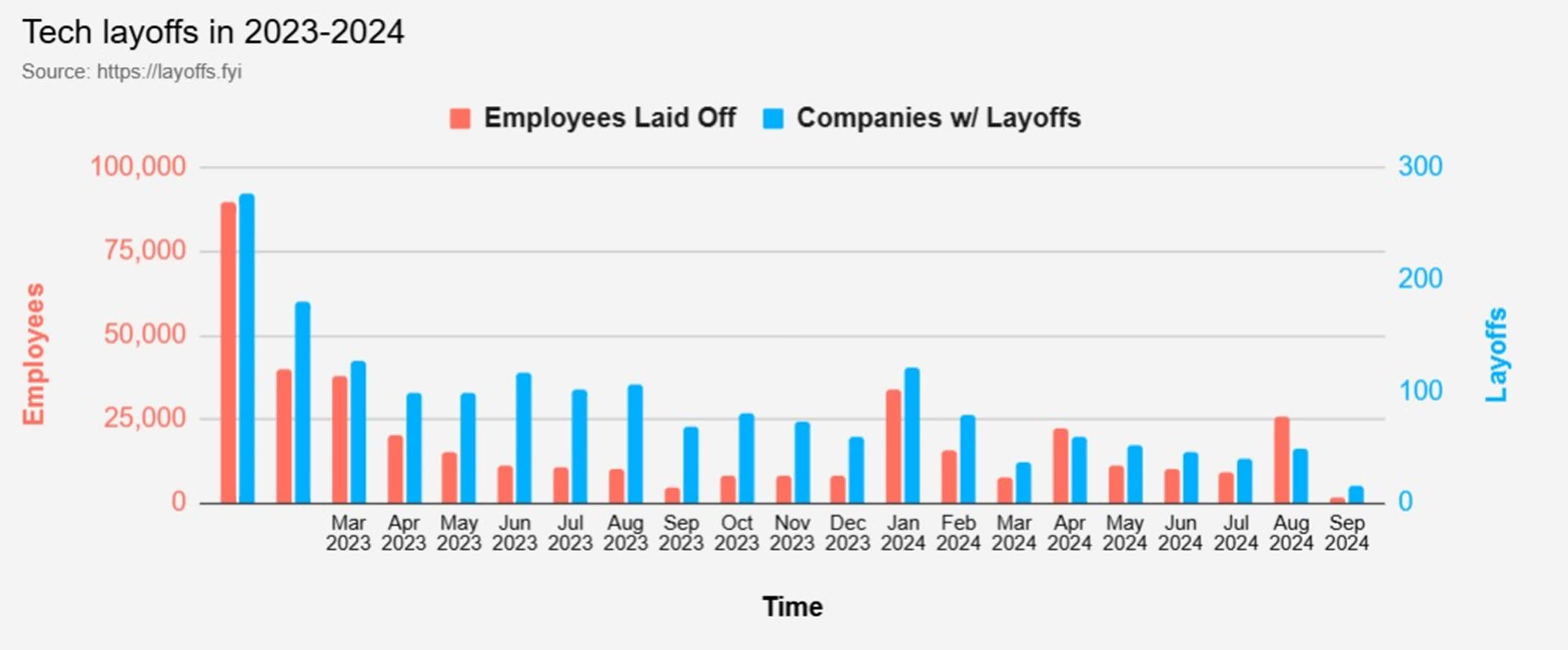The big picture: For decades, having a job in tech meant stability, regular raises, and lucrative perks. However, that has changed, perhaps permanently. The tech labor market is currently in upheaval, with firms letting go of employees by the thousands and tightening hiring requirements when they are looking to fill positions. The only safe space appears to be in AI.

Since the start of the year, more than 137,500 employees have been laid off from 438 tech companies, according to Layoffs.fyi. Meanwhile, postings for software development jobs have declined by over 30 percent since February 2020, according to Indeed.com.
Companies across the industry spectrum are cutting tech positions, including some of the largest names in the game. Alphabet, Amazon, Meta, and Microsoft have all downsized this year, along with eBay, Unity Software, SAP, Intel, PayPal, and Cisco.
Furthermore, employees who still have jobs are experiencing stagnant wage growth, according to Pequity, a compensation-planning startup. Wages have increased by an average of just 0.95 percent in 2024 compared to last year.
This is not new information for those in the industry seeking employment. Last year, over 260,000 workers across nearly 1,200 tech companies lost their jobs, making 2023 the second-largest year of layoffs on record in the technology sector, behind only the dot-com crash in 2001, according to Challenger, Gray & Christmas.
"The market isn't what it once was," Roger Lee, creator of Layoffs.fyi, told CNBC. "To secure a new position, many salespeople and recruiters are leaving tech entirely. Even engineers are compromising – accepting roles with less stability, a tougher work environment, or lower pay and benefits."
The trend doesn't appear to be part of the typical cyclical fluctuations that characterize tech employment, either. The Wall Street Journal recently referred to it as a fundamental reset in an industry that is readjusting its labor needs.
Instead of focusing on growth at all costs, companies are now zeroing in on revenue-generating products and services in their hiring strategies. This shift means that sectors that weren't very profitable, such as virtual reality and devices, are facing significant cuts. Tech firms are also scaling back on entry-level hires and eliminating recruiting teams.
Companies that are hiring are now looking for engineers with a broader skill set, including collaboration abilities and a working knowledge of the company's AI strategy. Ryan Sutton, executive director of the technology practice group at staffing firm Robert Half, told The Wall Street Journal, "They want to see people who are more versatile."
AI is one of the few areas experiencing growth, perhaps not surprisingly. Individuals who have worked on large language models can easily find jobs with salaries reaching $1 million a year. AI engineers are being offered two to four times the salary of a regular engineer, according to Pequity CEO Kaitlyn Knopp. "That's an extreme investment of an unknown technology," she said. "They cannot afford to invest in other talent because of that."
Tech workers may understandably feel a sense of whiplash from these changes. During the pandemic, firms went on a hiring spree as much of everyday life moved online. Employees were offered generous salaries and significant flexibility as companies competed for talent.
Then the economy cooled amid higher interest rates and inflation, leading to large-scale layoffs as companies jettisoned tens of thousands of jobs.
However, the current hiring trends are not as closely correlated to the economy as one might think. Nela Richardson, head of ADP Research, told The Wall Street Journal that the past few years represent the natural trajectory of an industry grounded in innovation. "You're not breaking as much new ground in terms of the digital space as in earlier time periods," she said.
